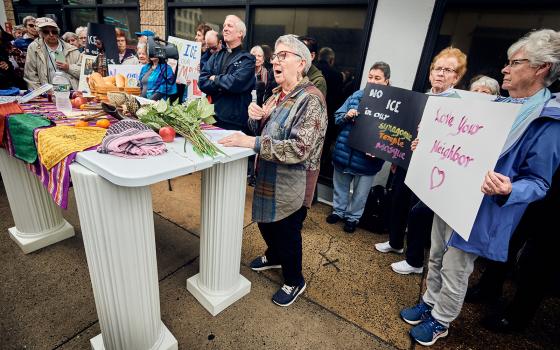

"The crowds rejoiced at all the marvelous deeds Jesus was doing" (Luke 13:17).
Rom 8:12-17; Luke 13:10-17
Luke is sometimes called the "Gospel of Women" for its emphasis on Jesus’ defense of women in a male-dominated culture that ignored or denigrated them. In today’s Gospel, Jesus is scolded by a synagogue official for healing a crippled woman on the sabbath. Recreating the scene helps us see just how unequal women were considered at the time.
First, it would have been impossible to ignore the crippled woman, who was bent over double, except that all women were segregated in the synagogue, perhaps behind a grille or half wall. Scholars debate this gender separation, but the Gospels do not record women reading or sharing in the discussion of the texts. The presence of a woman, even a notably deformed one, may have escaped the notice the official because she was not allowed to participate anyway. She was invisible. So, when Jesus goes out of his way to notice, address and heal her, it was an unusual occurrence. The crowd erupts in amazement at the miracle.
Instead of being likewise amazed, the synagogue official sees only a violation of the sabbath rule forbidding any kind of “work.” Jesus asks if it is legal to lead an ox from its pen to water it on the sabbath, which would have been permitted, but the official decides that Jesus’ act of touching or lifting the woman upright was work, but still not permissible according to his strained logic. He is determined to condemn Jesus. What is evident to the witnesses is the official's total lack of compassion for the woman while being obsessed with prohibiting any healing on the sabbath. The crowd's reaction praises Jesus’ mercy and rebukes the official’s narrow legalism.
One clue to the meaning of the 18 years of the affliction is that during all the centuries since God created a covenant with Abraham from which the Torah emerged under Moses, the Law of itself had never liberated anyone from sin. Only God’s grace, demonstrated by Jesus when he enabled “this daughter of Abraham” to stand upright, could do that. God’s grace in Jesus was now fulfilling and surpassing the Law, the real reason the synagogue official was so infuriated.
It is not hard to apply this story to the tangled, self-serving logic of any dominant culture or organization opposing full gender or racial equality to victims of discrimination. The Gospel breaks through these always obscure and hidden prejudices and liberates everyone to find their full potential. But to admit this is to demand that the whole system must change.
Advertisement






